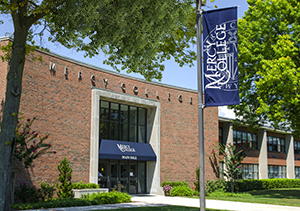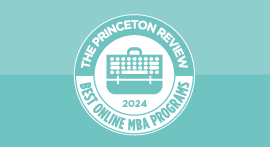Presented by Mercy College
“Corporations aren’t looking for textbook MBAs. They are looking for MBA graduates who know how to apply the new knowledge and skills they have acquired.” — Dr. Raymond L. Manganelli , Executive Dean of Mercy College’s Graduate School of Business
Beyond the Business Essentials - Components of an Effective MBA Program
Business leaders and entrepreneurs today are the lifeblood of a thriving economy. Effective leaders create economic prosperity for the organizations they run by serving customer needs profitably; they also contribute to the social and economic development of the communities in which they operate.
Successful graduate business programs not only offer training in the essentials—accounting, finance, management and marketing—but a “business trifecta” that combines the fundamentals with a penchant for critical thinking, managing uncertainty and complex problem-solving. MBA programs help students prepare for careers in corporations (large and small), government and non-profits. They also provide grounding for nascent entrepreneurs to turn their ideas into profitable businesses.
Recognizing the importance of practical knowledge, the Mercy College MBA program is taught by a faculty from a Fortune 500 network who apply real-world, experiential learning in the classroom. Moreover, the Strategic Consulting Institute (SCI) at Mercy enables students to work with business and government executives on projects that address problems facing their organizations.

Mercy’s main campus sits on 66 picturesque acres located at the foot of the Hudson River in the Village of Dobbs Ferry, NY. The campus has two dorms, and easy access to public transportation via Metro-North Railroad and Bee-Line Busses, (Westchester County)
Areas of Concentration - Options to Tailor Your Degree
A Mercy MBA offers students eight areas of concentration—Finance, Managerial Analytics, Management, Marketing, Accounting, HR, Organizational Leadership and International Business. Students also have the option for graduate degrees in either Human Resource Management or Organizational Leadership.
Mercy College welcomes students with both traditional and non-traditional business backgrounds who want to augment their current work experience with the business fundamentals. Doctors, dentists and lawyers interested in gaining practical business experience to run their practices and firms more effectively are among our MBA alumni as are aspiring small business entrepreneurs.
In addition, established business leaders have enrolled in our MBA and graduate programs in Organizational Leadership and Human Resource Management to provide new skills to help them make a career change.
One of our most popular concentrations is Managerial Analytics , which provides students the skills to source, analyze and apply insights derived from the wealth of data and information now available—much of it in real-time. While these skills are universally useful, we’re seeing increasing interest from the health care, finance and marketing sectors in this expertise.

Mercy has three other campuses located in: The Bronx, Yorktown Heights and Manhattan (in the heart of Herald Square).
Trends in the Field - What Employers Want
Strategic thinking and sharp analytical skills remain business essentials. However, as data and information management move into the C-suite and the digital age matures, the MBA degree today is very different than it was in year’s past. Business leaders want insights and thoughtful analysis, not mere data. Therefore, MBAs must understand—almost instinctively—how to source, analyze and manage the vast amounts of data at their disposal. Equally important, they must be expert in applying these insights to solve complex business problems.
To be successful in business today requires training not only in the business essentials—accounting, finance, management and marketing—it requires additional proficiency in managerial analytics. Analytics experts enable businesses to turn data into insight and insight into smart decisions. Couple those fundamentals with what I call the “business trifecta”—the ability think critically, manage business uncertainty and solve complex business problems—and you have a winning, distinguishable skillset.
Mercy’s emphasis on real-world experiences, which starts with our executive-based faculty model and continues with student-run business projects for the Strategic Consulting Institute (SCI), aligns with these trends.
Successful candidates in our MBA program push traditional boundaries and aren’t afraid to color outside the lines. Doing so sharpens their critical thinking skills that are absolutely essential.
Mercy College MBAs have gone on to secure lucrative positions and receive promotions at leading companies or to launch successful businesses. What sets them apart is their ability to translate their newly acquired skills to the challenges on the job as a result of their involvement with the Strategic Consulting Institute (SCI) at Mercy and our executive-based learning model.
*** One Piece of Advice - Before You Apply ***
When choosing an MBA or graduate program, ensure the degree and your career goals are in strategic alignment. Don’t just get a degree . Find an educational institution that enables you to apply your new skills to real world business problems while you are enrolled in the program. This experience will help you more precisely identify your next career move and is particularly important for students with non-traditional business backgrounds. In addition, the marriage of a graduate business degree with expertise in STEM (Science, Technology, Engineering and Mathematics) is also a proven formula for career success and provides graduates with a competitive edge.

About the Author: Dean Raymond Manganelli
Dr. Raymond L. Manganelli , Executive Dean of Mercy College’s Graduate School of Business, is a transformative leader with significant management, consulting and fund-raising experience. From academe to big and small companies alike, he impacts traditional paradigms—transforming businesses into productive and competitive organizations. Manganelli is the architect of Mercy College’s innovative one-year, MBA TURBO Program. He also has served as a trusted counselor to Blackstone, Merrill Lynch, IBM, Swiss Re, NYSE, GM, and Exxon Mobile.

Find MBA Programs Matched to Your Interests
Explore our featured business schools to find those that are looking for students like you.

Top Online MBA Programs
On a mission to increase your salary? Our Top 50 Online MBA ranking is based on academics, career outcomes, tech platforms, and more.

Best Career Prospects
Find out which schools have the best track records for getting students jobs—and the highest starting salaries.

Top Schools for Entrepreneurship
Ready to build your own business from the ground up? Check out these 50 graduate programs.